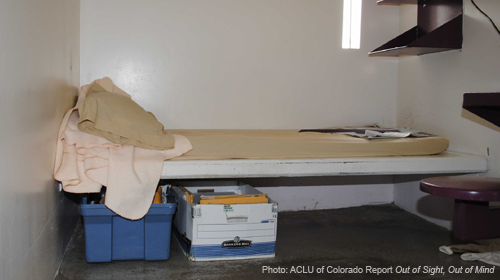Out of Sight, Out of Mind: Colorado Continues to Warehouse Mentally Ill Prisoners in Solitary


Fifteen years ago, John Quinn* was a bright high school student with a promising future. A talented athlete, he was a star baseball and football player who earned his black belt in karate at age 10. By all accounts, John was a friendly, intelligent kid who showed no sign of mental illness.
Today, John is rarely coherent and suffers from delusions and auditory hallucinations. He has attempted suicide three times. At least eight psychiatrists have diagnosed John as suffering from serious mental illness with psychotic features, including chronic paranoid schizophrenia. Fifteen years of solitary confinement in the Colorado prison system has completely eradicated the bright young man he had once been.
Imprisoned at age 18, John was almost immediately isolated in “administrative segregation” – Colorado’s term for solitary confinement – for participating in a three-way phone call and tampering with a bathroom lock. He has never seriously harmed anyone during his many years in prison, yet he has never been able to work his way out of solitary confinement. After the first few years spent in isolation, John’s mental health started to slip away.
As his mental health began to deteriorate, John repeatedly requested to see a psychiatrist. He was rapidly losing his ability to think rationally, yet retained enough sanity to recognize he was in trouble. Not only were his pleas ignored, John was frequently disciplined for asking for mental health treatment. For years, John was left to deal with the voices and delusions on his own.
In late 2012, John was moved to Colorado Department of Correction’s new “Residential Treatment Program,” a program ostensibly designed to provide intensive mental health treatment for selected seriously mentally ill prisoners and avoid placing them in long-term solitary confinement. John’s “intensive” mental health treatment has thus far consisted of an average of 12 minutes of individual therapy and 41 minutes of group therapy each week. Otherwise, John is alone in his cell most of the time.
As long as he remains in solitary confinement and is denied meaningful mental health treatment, John will likely never regain his mental health or achieve any significant improvement. He may also continue to deteriorate. The smart, fully functional young man he had once been is gone forever.
Unfortunately, John’s situation is not unique. According to a , Colorado currently holds 87 prisoners suffering from serious mental illness in solitary confinement. The number of prisoners in solitary confinement with moderate mental illness is much higher. This is despite the fact that a growing majority of the psychiatric community agrees that isolating seriously mentally ill prisoners for any length of time further damages their mental health. Additionally, courts across the country have been unanimous in finding that such isolation is a violation of the Eighth Amendment’s ban on cruel and unusual punishment.
Tom Clements, the late Colorado Department of Corrections Director, had been an advocate for reducing the use of solitary confinement as a way to deal with mentally ill prisoners. Prior to his death, Mr. Clements had been working with the ACLU of Colorado on devising better ways to treat the mentally ill in the prison system. We hope the incoming director, Rick Raemisch, who began his position last week, will fulfill Mr. Clements’ legacy and end the use of solitary confinement on mentally ill prisoners.
There are reasons to be optimistic. Raemisch successfully led the Wisconsin prison system after a federal court ordered all prisoners with serious mental illness be removed from its Supermax Correctional Institution. Unlike Colorado prison officials, he is used to working in a system that does not lock away its mentally ill prisoners in long-term solitary confinement.
Colorado’s practice of warehousing mentally ill prisoners in solitary confinement has left the state wide open to legal challenge. Raemisch’s actions over the next few months will determine whether the Colorado Department of Corrections becomes a leader or a cautionary tale.
Read the complete report Out of Sight, Out of Mind: Colorado’s Continued Warehousing of Mentally Ill Prisoners in Solitary Confinement .
Click for a fact sheet on mentally ill prisoners in solitary confinement in Colorado.
Thousands of prisoners in California are on hunger strike to protest being held in solitary confinement for decades. Stand with these courageous men to put an end to this inhumane practice.
*Name has been changed to protect privacy.
Learn more about solitary confinement and other civil liberty issues: Sign up for breaking news alerts, , and .

